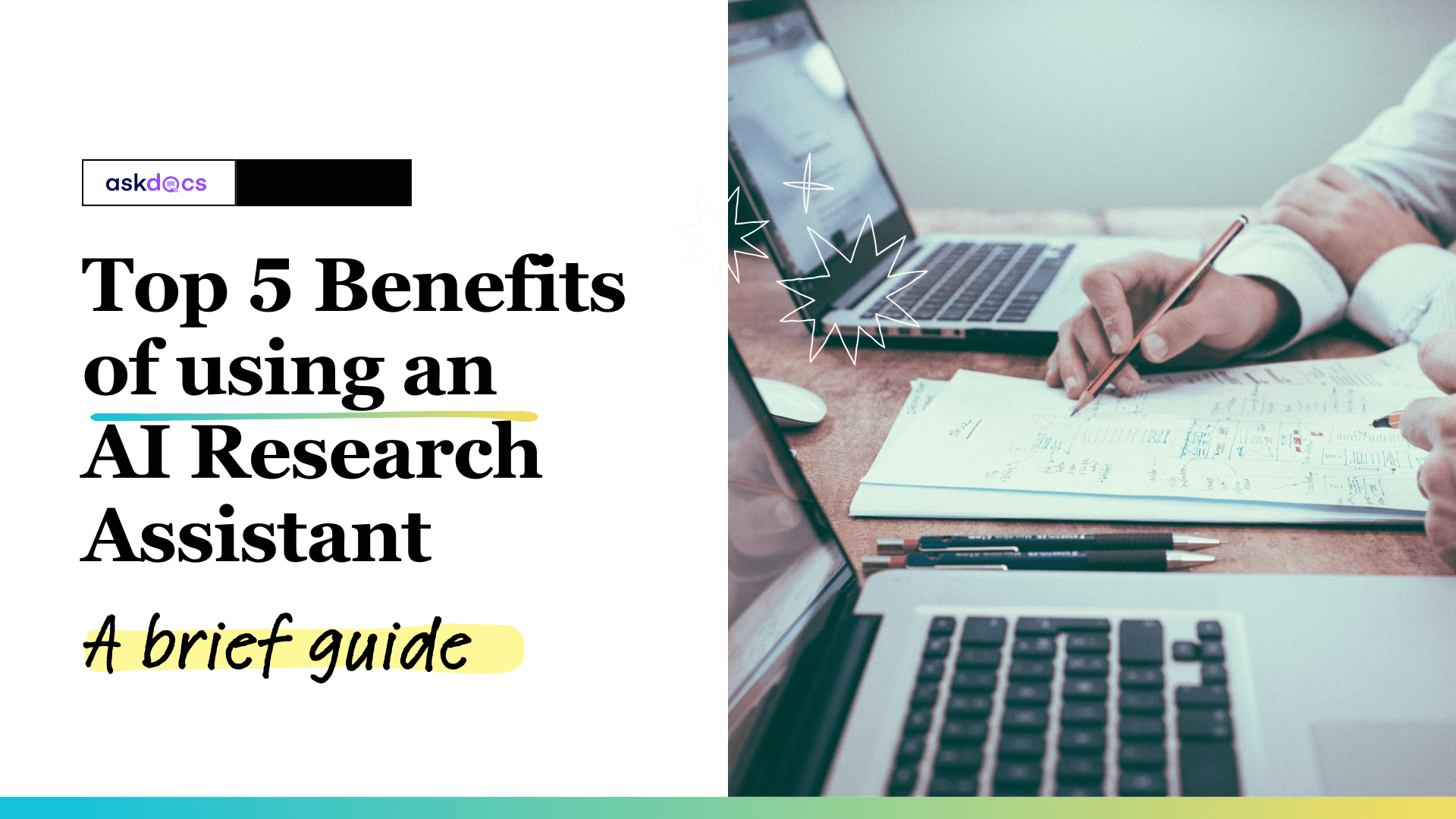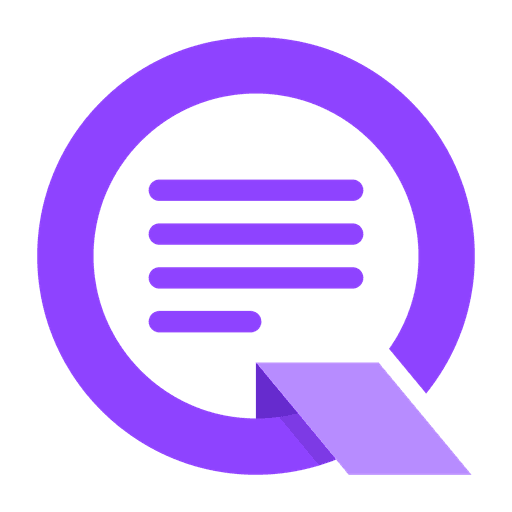
Top 5 Benefits of using an AI Research Assistant
Uncover how AI research assistant are revolutionizing academia and knowledge work with streamlined workflows, enhanced collaboration, data organization, personalized insights, and improved productivity, making research smarter and faster.
Oct 16, 2024
AskDocs Team
New smart tools are changing how researchers in academic and professional settings do their work. AI research assistant, help students, scientists, teachers, and professionals work faster and better. They can look at many research papers and reports in just a few minutes. This helps researchers find important facts and new ideas in their field without spending days reading. AI assistants also help organize information, making it easier for researchers to find what they need later.
One big advantage is that AI assistants save time. They can do tasks like collecting data and sorting through research papers and documents. This leaves researchers more time to think about big ideas and solve problems. AI can even help find connections between different areas of study, leading to new discoveries. While these tools are helpful, it's important to remember that they don't replace human thinking. Researchers still need to use their own brains to make sure their work is good and fair.
Accelerate Literature Review Process
AI research assistants streamline research workflows by automating routine tasks like literature reviews and data organization. They quickly scan, sort, and summarize vast amounts of research papers, cutting down the time and effort traditionally spent on these tasks. This allows researchers to focus on analysis and creativity instead of getting bogged down by manual data management.
These AI tools don't just speed up the process—they enhance it. By swiftly organizing and synthesizing information from multiple sources, they provide researchers with a comprehensive overview of their field. This bird's-eye view helps identify emerging trends, research gaps, and potential collaborations that might be missed in a traditional, time-consuming literature review. The AI assistant can also generate concise summaries of key findings, saving researchers from the need to read every paper in full.
Here's what AI research assistants bring to your literature review:
Lightning-Fast Document Skimming: Analyzes thousands of papers and documents in minutes, not months.
Quick Information Retrieval: Finds relevant studies and insights fast, eliminating the need for manual searches.
Insightful Summaries: Condenses complex research into digestible highlights, giving you the big picture at a glance.
Trend Identification: Spots emerging patterns and research directions across multiple papers.
Time-Saving Efficiency: Dramatically cuts down on literature review time, allowing more focus on original research
With AI research assistants, the daunting task of literature review becomes manageable and even exciting. You're no longer drowning in papers—you're surfing the wave of cutting-edge research with ease. For a detailed approach on how to effectively utilize AI chat tools in reading and extracting data from research papers, you might find our step-by-step guide on using AI chat tools for research papers particularly insightful.
Enhanced Data Organization and Management
AI research assistants are like Marie Kondo for your data, automatically categorizing and structuring your research information so you can actually find what you need when you need it. No more digging through endless folders or scratching your head wondering where you saved that crucial piece of information.
These AI research assistants don't just file things away—they create a smart, interconnected web of your research data. They can spot patterns and connections that might take you weeks to notice, linking related concepts across different papers and datasets. It's like having a research librarian, data analyst, and mind-reader all rolled into one. Need to find all the studies on a specific protein from the last five years? Your AI assistant can pull that up faster than you can say "literature review."
Here's how AI research assistants supercharge your data organization:
Automatic Categorization: Sorts your research materials into logical categories without you lifting a finger.
Smart Tagging: Applies relevant tags to your data, making it searchable in multiple ways.
Cross-Referencing: Links related information across different sources, helping you see the big picture.
Custom Organization: Learns your preferences and adapts to your unique research style.
Instant Retrieval: Finds the exact piece of information you need in seconds, not hours.
With an AI research assistant, your data isn't just organized—it's primed for discovery. You'll spend less time managing your information and more time making breakthrough insights. It's not just about keeping your digital desk tidy; it's about setting the stage for your next big research breakthrough.
Enhancing Collaboration and Communication
AI research assistants transform collaboration and communication for researchers and professionals. AI-powered research assistants are now capable of providing real-time translations, facilitating seamless communication among international research teams and potentially accelerating the pace of scientific discovery.
These AI tools offer a range of features designed to streamline multilingual collaboration. Real-time translation capabilities allow researchers to communicate instantly in their native languages, with the AI converting messages on the fly. Document translation features enable the sharing of research papers and data sets across language boundaries, ensuring all team members can contribute equally regardless of their linguistic background.
Key functionalities of AI research assistants in cross-language collaboration include:
Instant messaging translation
Automatic document translation
Voice-to-text translation for verbal communications
Context-aware translations that account for scientific terminology
Multilingual data analysis and reporting
With AI research assistants, language differences become a strength rather than a barrier. You're not just collaborating; you're tapping into a global pool of knowledge and perspectives. It's not about speaking the same language—it's about speaking the universal language of groundbreaking research.
Boost Productivity and Efficiency
AI research assistants boost productivity and efficiency. They help you focus on what matters by cutting through information clutter. Need relevant literature for your research? AI tools streamline this process, saving you hours.
AI organizes your research papers in neat, customizable formats. This turns a messy pile of documents into a well-structured database. You can spot patterns and draw meaningful conclusions without getting lost in details. AI research assistants are capable of handling a wide range of time-consuming tasks that traditionally occupied a substantial portion of researchers' time.
AI tools help manage your workload, offering significant time savings and better organization. By offloading these tasks to AI, researchers can redirect their efforts towards more complex and intellectually demanding aspects of their work. The efficiency gains extend beyond individual tasks. AI assistants are also proving adept at optimizing entire research workflows. For more detailed information on how AI-powered document analysis can significantly boost productivity and improve decision-making, explore our comprehensive guide on AI-powered document analysis.
Personalized Insights and Recommendations for Researchers
As AI usage continues to expand with the research space, it will offer a level of personalization previously unattainable. AI-powered research assistants are learning from individual researchers' interests and habits, providing tailored suggestions that can significantly enhance research outcomes and directions.
In the future AI research assistants will be able to analyze a researcher's work patterns, publication history, and areas of interest. Based on this analysis, they offer personalized recommendations in several key areas:
Relevant academic papers and preprints
Potential research collaborators
Emerging trends in specific fields
Funding opportunities aligned with research interests
Conferences and journals for paper submissions
The personalization extends beyond simple keyword matching. These AI systems can identify subtle patterns and connections across disciplines, potentially leading to novel research directions. For instance, the system might suggest a biology paper to a computer scientist working on neural networks, spurring cross-disciplinary innovation.
However, the use of such personalized AI tools raises questions about the potential for creating 'filter bubbles' in research, where scientists might become overly focused on AI-suggested areas. There are also concerns about data privacy, given the amount of personal information these systems process to generate recommendations.
Despite these challenges, the trend towards personalized AI research assistants is gaining momentum. As these tools become more sophisticated, they have the potential to not only streamline research processes but also reshape how scientific discovery itself unfolds, potentially leading to more targeted and efficient research efforts across all disciplines.
Overcoming Challenges with AI Research Assistant
While AI tools offer transformative potential in research, its implementation is not without challenges. One significant hurdle is algorithmic bias, with AI potentially perpetuating and amplifying existing prejudices in their training data. This issue can lead to skewed results and reinforce societal inequalities, undermining the integrity of research outcomes.
Result accuracy can be an issue. AI tools may not provide complete or fully accurate information. Verifying AI-generated insights with trusted sources is crucial.
Ethics matter too. We must address potential biases and ensure data accuracy. Using AI responsibly helps protect privacy and security.
Data privacy and security pose equally significant problems. AI-driven research often requires vast amounts of data, raising concerns about protecting sensitive information and complying with data protection regulations. Researchers must implement safeguards to balance the need for comprehensive data with respect for individual privacy rights.
To handle these challenges, combine AI tools with other resources and human-in-the-loop. This approach improves results and overcomes AI limitations. Awareness of these issues helps researchers use AI effectively and ethically. Understanding these challenges helps researchers use AI tools effectively for innovative and reliable research.
Key Takeaways for academic and professional researchers
Let's face it: research can be a real grind. But what if you had a tireless sidekick to help you out? That's where AI research assistants come in, and they're changing the game for academics and professionals alike. Here's why you should consider bringing one into your research toolkit:
Remember, AI research assistants aren't here to replace your expertise – they're here to amplify it. By embracing these tools, you're setting yourself up for smoother collaborations, deeper insights, and research that packs a punch. So why not give it a try? Get started with AskDocsAI today! Your future self (and your sanity) will thank you!
AskDocs is your generative AI assistant that can quickly read, understand, find, and summarize information from your documents.
Copyright © AskDocs | 2025
